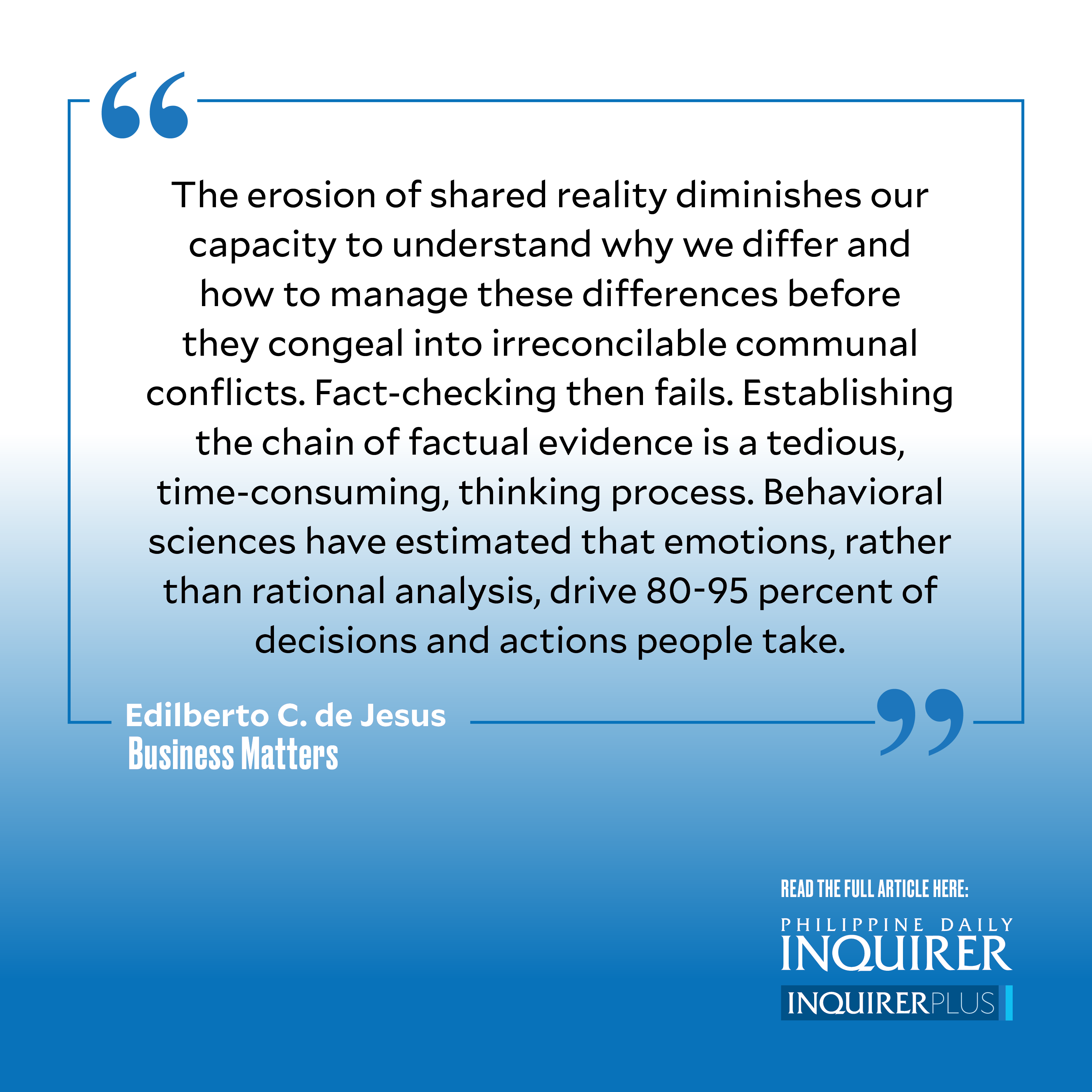
This title diminishes the scope and message of Maria Ressa’s book. It is not just about the Nobel Peace Prize recipient’s personal struggle to defend herself and Rappler against 23 cases, carrying a cumulative jail term of roughly a hundred years, launched since 2017 by the Duterte administration. Documenting how governments around the world have weaponized legal systems and exploited technology to target their critics, Ressa exposes the challenge that transcends politics and threatens us all: the erosion of the foundational premise permitting society to function—the belief in our ability to establish and accept objective facts.
“Objective facts” seems redundant; but these need to be contrasted with “alternative facts” or, in one word, lies. Ressa presents in print propositions she has stressed in earlier speeches: “Without facts, you can’t have truth. Without truth, you can’t have trust. Without all three, we have no shared reality.” The erosion of shared reality diminishes our capacity to understand why we differ and how to manage these differences before they congeal into irreconcilable communal conflicts. Fact-checking then fails. Establishing the chain of factual evidence is a tedious, time-consuming, thinking process. Behavioral sciences have estimated that emotions, rather than rational analysis, drive 80-95 percent of decisions and actions people take.
Far easier to manufacture than to refute lies, which also more effectively excite emotions. Ressa explains how social media technology has taken these insights to make disinformation campaigns for business and political purposes more potent. President Marcos Jr.’s claims that Marcos Sr. had never stolen public funds and that Imelda had won all corruption cases against her were shared 331,000 times; fact-checking exposing them as lies received 3,500 shares. The more outrageous the lie, the more enticing as “clickbait.” By sharing unverified posts, the audience becomes naively or maliciously complicit in “astroturfing” to produce a trending, bandwagon effect. Senators and congressmen who helped propagate, during televised congressional hearings, the lie of Leila de Lima’s alleged participation in a sex video contributed to astroturfing.
Ressa also shows how the promotion of half-truths to promote fear, uncertainty, and doubt can just as effectively mislead the public. It is true, for instance, that many communities have suffered from the problem of drug addiction and worry about its spread. The Social Weather Stations recorded survey respondents listing drug-trafficking as seventh or eighth among their top 10 concerns. By the 2016 elections, drugs had become the foremost issue for voters, providing a stunning lesson in the power of disinformation, later blandly dubbed by Facebook as coordinated inauthentic behavior (CIB).
“Sam,” a 20-something internet content creator and influencer in Duterte’s campaign team, claimed credit for promoting the drug issue in his online platforms. CIB strategies included distributing widely on the web reports and photos of crimes committed in other countries as having taken place in the Philippines. Or falsely suggesting heinous crimes committed in the Philippines as connected to drugs. As Sam boasted to Ressa, ”I’m like a god. I can make [people] do what I want them to do.”
More accurately, Sam developed the skills, now eagerly coveted by business and political interests, to deceive people into accepting the views his clients want him to peddle; he admits that some people would consider his astroturfing campaigns as “evil.” But Sam and his colleagues could not prosper without the social media technology and business model developed by Facebook, where profitability depends on the volume of content produced and the speed of their distribution and recycling. One fake FB account can reach three to four million readers. Truth or falsity of content or authenticity of authorship is irrelevant; only virality matters.
After four fruitless years urging Zuckerberg to address Facebook’s ethical problems, Ressa has concluded that Facebook “represents one of the greatest threats to democracies around the world.” But 97 percent of Filipinos go to Facebook seeking entertainment, education, and relationships. How do we protect against the “corrosive effects” of Facebook protocols and algorithms on truth and society’s shared reality and values? How do they impact the next generation’s learning and values?
The subtitle of Ressa’s book reflects what is at stake: “The fight for our future.”
——————
Edilberto C. de Jesus is professor emeritus at the Asian Institute of Management.
——————
Business Matters is a project of the Makati Business Club (makatibusinessclub@mbc.com.ph).